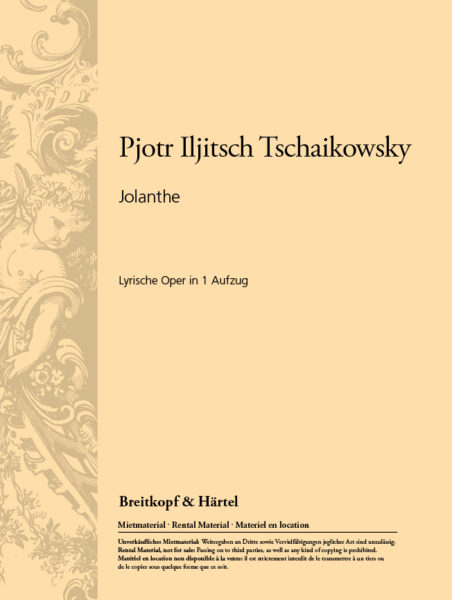Pjotr Iljitsch Tschaikowsky (1840–1893) Jolanthe
Lyrische Oper in 1 Aufzug Dauer: 90' Text: Modest Tschaikowsky
Soli: SMezATTBarBarBB – 3(Picc).2.Eh.2.2. – 4.2.3.1. – Pk – Hfe – Str
Durchaus lohnend ist der Einakter, 2009 im Prinzregententheater vom Münchner Rundfunkorchester konzertant wiederentdeckt. Eine ebenso berührende wie vieldeutige Handlung, ein dichtes, hoch theatrales Libretto, merkt Michael Stallknecht in der Süddeutschen Zeitung an.
Tschaikowskys letzte Oper auf ein Libretto seines Bruders Modest nach der Dramenvorlage des dänischen Schriftstellers Henrik Hertz lebt von den poetischen Momenten und den symbolbeladenen Charakterporträts der Hauptfiguren: Die junge, blinde Jolanthe wird von ihrem Vater aus Sorge um ihren Makel und zum Schutz ihrer Jungfräulichkeit und vor den Widrigkeiten der Welt in einen paradiesischen Garten gesperrt. Er befielt zu ihrem Schutz, sie um ihre Blindheit unwissend zu lassen. Ein Arzt warnt, sehen werde sie nur können, wenn sie es selbst wolle, gleich welche Ängste aus der vollständigen Erkenntnis der Welt erwachsen. Als der junge Vaudémont in ihre Abgeschiedenheit einbricht und sich beide ineinander verlieben, befreit er sie von ihrer Unwissenheit, erklärt was Farbe und Licht bedeuten. Erst die Liebe zu ihm macht sie sehend.
Die dunkle Welt der Jolanthe zeichnet Tschaikowsky zu Beginn musikalisch durch eine Introduktion ausschließlich für Bläser. Erst mit dem Eintritt in die unbekannte Welt der Liebe und des Sehens verwendet Tschaikowsky einen warmen Streicherklang. Gerade dadurch stieß die Oper wohl bei Zeitgenossen auf Verstörung.
Tschaikowskys Jolanthe nimmt in seinem Opernschaffen eine Sonderstellung ein: neben dem glücklichen Ende, einer Apotheose des Lichts und der Liebe mit einem religiös geprägten Schlusschoral, ist es eines der wenigen Bühnenwerke Tschaikowskys ohne Bezug zur russischen Geschichte. Der ausgeprägte Lyrismus des Werks verweist stattdessen auf Tschaikowskys Nähe zur französischen Kultur, die im 19. Jahrhundert einen starken Einfluss auf Russland hatte.
Die Oper wurde 1892 am Mariinsky-Theater in Sankt Petersburg als Auftragswerk zusammen mit seinem Ballett Der Nussknacker uraufgeführt.
Neben der Produktion des Münchner Rundfunkorchesters wurde Jolanthe szenisch erfolgreich bei den Festspielen Baden-Baden mit Anna Netrebko und Piotr Beczala als Liebespaar rehabilitiert. Außerhalb Deutschlands lief die Opernrarität in Toulouse, Tokyo, San Sebastian und Monte Carlo.
Zuletzt erneut die Süddeutsche Zeitung: Jolanthe ist eine Opernausgrabung, die wirklich zu Unrecht vergessen ist.
| Einleitung |
| 1. Szene und Arioso der Jolanthe |
| 2. Szene und Chor |
| 3. Szene und Chor |
| 4. Szene und Arioso des Königs |
| 5. Szene und Monolog des Ibn-Hakias |
| 6a. Szene und Arie des Roberts |
| 6b. Vaudémonts Romanze |
| 7. Szene und Duett der Jolanthe und des Vaudémonts |
| 8. Szene |
| 9. Finale |









